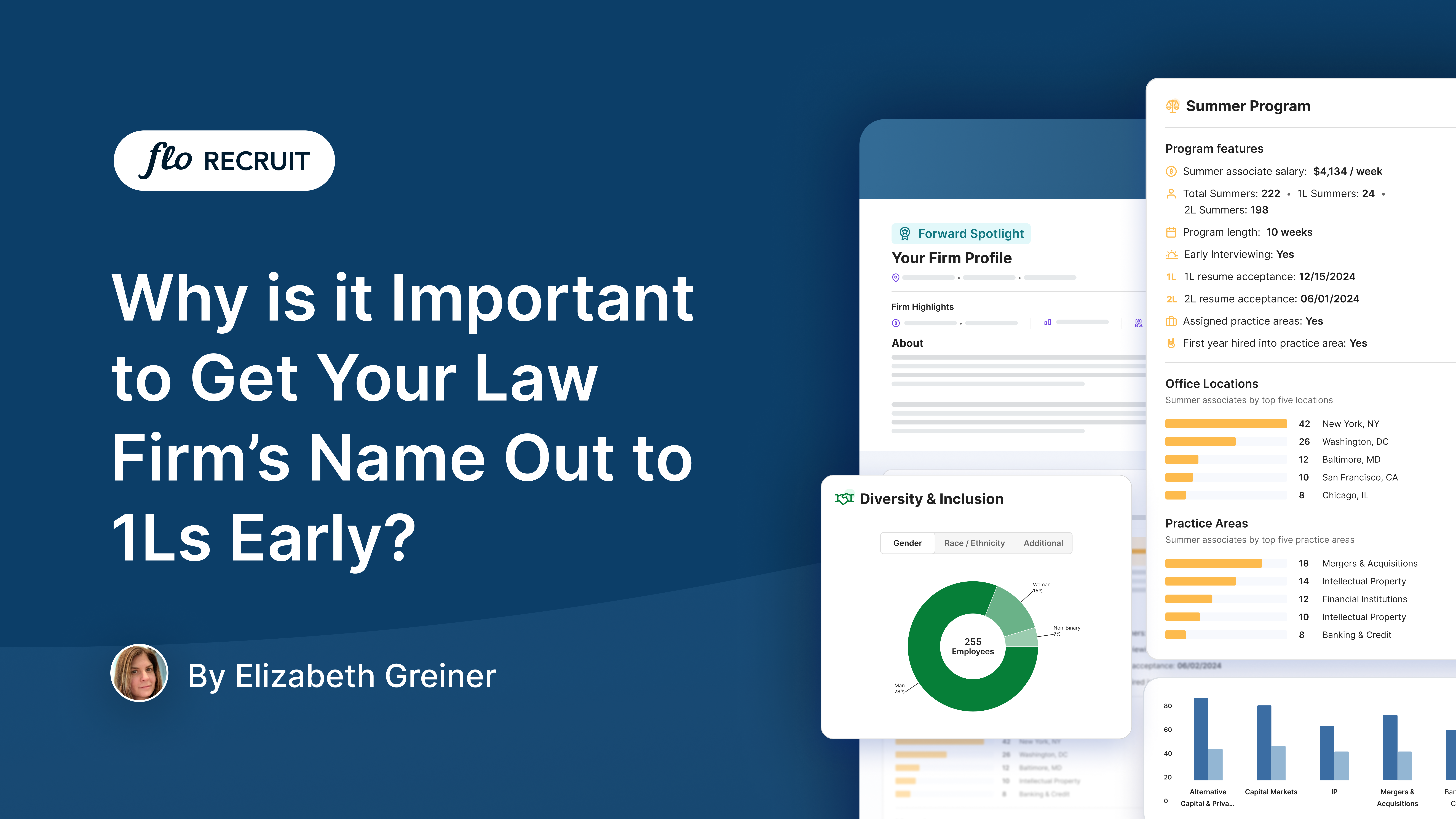Top 8 Ways Law Firms Distinguish Themselves, Including in Partner Hiring
It’s a constant challenge for law firms to differentiate from the competition both to attract talent and to generate new clients. If there was one specific thing all firms could do to improve their client attraction and partner hiring results, they would do it. However, separating your firm from the pack requires a lot of moving parts, successfully aligned, to differentiate and drive results.
Here are 8 topics regarding differentiation that will pay dividends.
- Quality and Culture - Several years ago, in an article on law firms differentiating themselves, market leading legal consulting firm Fairfax Associates suggested that clients view law firms quality of legal services and firm culture as “table stakes” when hiring a law firm. So while it is still meaningful for firms to maintain and publicize high partner rankings (Chambers, Best Partners etc.), maintain deal table rankings, and be able to point to industry recognition in the American Lawyer and other legal publications, the quality of a firm's lawyering by itself will typically not attract clients or lateral partners.

Similarly, a firm’s culture is not a distinguishing factor to a client looking for a new firm. And although culture is much more of a key factor to partners looking to change firms (open comp/closed comp, easy access to specialized expertise, tax, executive compensation, trusts & estates etc.), there are other more compelling areas that drive final decisions externally. - Depth of Expertise - According to Fairfax, and reinforced by many others in legal consulting, clients are increasingly laser focused on selecting lawyers with proven expertise in increasingly niche areas of law. Clients as legal consumers no longer rely on one firm for all of their legal work, rather going to a variety of firms to tap their very specific expertise. As a result, firms must make increasingly focused decisions about where they want to compete.
- Strategic Focus - In my experience, virtually all AmLaw 200 firms annually stress growth as a strategic priority. However, since the pandemic and in the post-pandemic years, I’d posit that only 10-15% of AmLaw 200 firms have developed and implemented a genuinely strategic growth strategy. The results in the last several years have seen several of the largest and most profitable firms compete fiercely for talent, and win, in an effort to separate themselves from the pack. That trend will continue.
- Strategic Focus II - For firms to be competitive at any level in the AmLaw 200, Fairfax suggests its critical that firms focus on 3 to 4 practice areas (Private Equity M&A, Energy, Renewables, IP Litigation etc.), or maybe just 1-2 areas and build superior depth and expertise focused in those areas to attract clients and talent. This approach is likely to require a substantial investment in partner hiring. More importantly, Firm Leadership, however it is composed, will need to convince its partners to commit to a focused approach in order to be competitive.
- Resistance - We all know the challenge in getting partners in our firms on the same page. It's the nature of lawyering to be adversarial. So it is a virtual guarantee that partners in areas other than the ones chosen by the firm as the primary areas of focus will resist, as they will feel marginalized. However, the reality is that no firm can credibly be a market leader in every practice area. (For those of us old enough to remember, Sears is a good example in the similarly competitive retail space).

Those resistant partners need to be reminded/directed that a strategically focused growth effort will lead to a raised market profile, heightened brand awareness and a recognition of practice growth. Firms stand to benefit overall from improved external perception that will lead to enhanced opportunities for all at the firm. A rising tide raises all boats. While there are other ways to differentiate (improved service delivery, alternative fee arrangements, firm pedigree, price) the firms that are currently the most focused on growth are making key talent acquisitions and growing in the practice areas that they have determined are the most strategic and profitable. - Alignment - So now we’ve done the easy part, getting Firm Management to present a strategic growth plan focused on 3-4 areas of industry expertise that all firm partners are bought into. Right?! Not realistic, of course but firms that don't want to be obsolete need a successful growth strategy. As Recruiting Leaders, our job is to get our firms as close as we can to a strategic growth focus, then work with what we have to achieve the best possible results. If a firm can successfully get itself strategically focused in a way that is attractive to the market, it's our job to put the pieces in place to effectively market the firm to potential partner candidates.
- Distinguishing Your Recruiting Team/Process - This requires:
- If the firm has a focused strategic growth strategy, the recruiting team has a focused partner hiring strategy. Legal search firms want the searches a firm is most motivated to close. Giving them a short list of priorities and clear direction re the firm's strategic growth priorities is what they want/need to help you.
- Alignment in the Partner Hiring Process, including a Recruiting Chief, Senior Director or Director that has full access to the partners who make the final hiring decisions at their respective firms, and including Firm Chairs, COO’s, CFO’s, Firmwide Industry or Practice Section Leaders or anyone else who is key to the decision making process is a must.
- That senior recruiter must also have credibility within the firm to present market compensation information to firm management. Deals die if partners don’t understand that in making lateral partner offers you are competing in the marketplace for talent, and the marketplace drives the compensation, not your current partners’ compensation. Most partners, even in management, struggle with that concept. The senior recruiter has to be credible in helping partners understand the competitive marketplace for talent.

- Excellent collateral materials in PDF form that can be shared with candidates and search firms for quick reference. The materials should include strategic areas of focus, key firm metrics (PPEP, PPP, RPL, Revenue, Revenue Growth etc.), recent lateral partner hires and anything else that puts your firm in the best possible light, including industry focus and the firm’s key clients in each.
- A strategic outreach program to key legal search firms in all of the markets you recruit. While it's important to motivate your partners to make referrals and encourage their friends and colleagues to consider your firm, it's equally important to engage the legal search community, particularly your trusted circle of search firms, as they are crucial to market perception of your firm. The more information a trusted search firm has about your firm and its partners, the easier it is for them to find the types of candidates you really want to hire, frequently even if they are not actively looking. Meet in person with those search firms, provide them access to your key recruiting partners, cultivate those relationships.
- If you don't already have a robust partner integration program, you need one right away. If you do, make sure to highlight it with candidates and search firms, including testimonials in your collateral materials.
- While the recruiting and offer processes must be thorough for all parties, they must also move effectively and efficiently. Over the years that I worked for firms up through today, the major complaint I hear from search firms is that firms don't move fast enough to close candidates and it is immensely frustrating. To compete for top talent, firms simply must move with dispatch.

- Flo Recruit - Flo’s market leading Applicant Tracking System (ATS) gives law firms a competitive edge in the process of hiring partners and associates. In particular, the partner hiring process is data intensive with significant participation by partners and staff. Flo Recruit offers state of the art virtual interviewing capacity along with easy access to all key data including Firm LPQ’s, evaluations, resumes and feedback from attorney interviews. Custom reports are built into the system and can be modified to meet any firm's individual needs. Flo Recruit is crucial if you want to have a fast, efficient, accurate partner hiring process, and differentiate yourself as a firm.
In summary, an identifiable strategic growth strategy combined with a flawless recruiting process is a recipe for success!!
.jpg)

